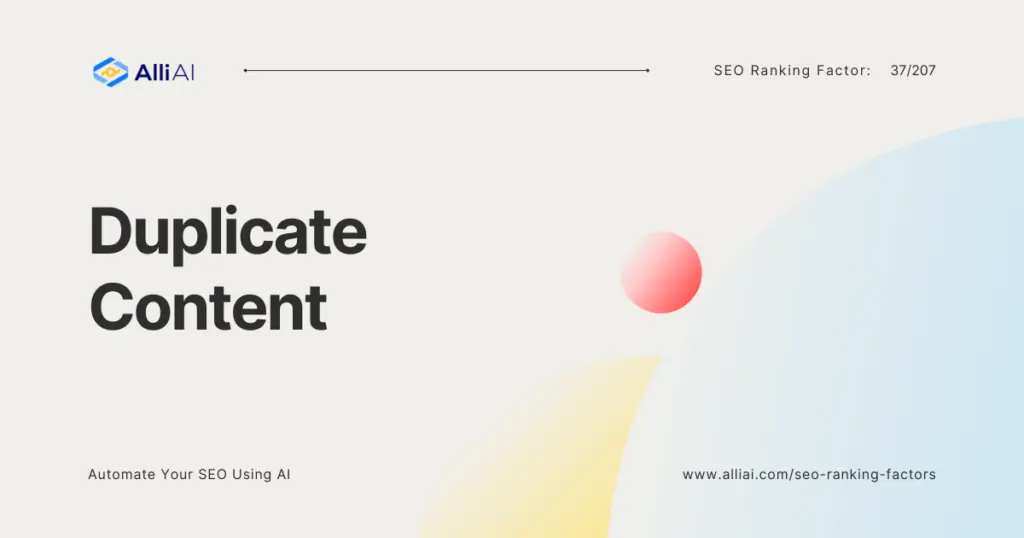What is Duplicate Content?
Explanation of Duplicate Content: Duplicate content refers to substantial blocks of content across domains that either completely match other content or are appreciably similar. Essentially, it’s when the same content appears in more than one place on the internet. That “place” is defined by a unique URL, which means if the same content appears at more than one web address, you’ve got duplicate content.
Imagine you’ve written a novel and it gets published under different titles and covers by various publishers without your consent. Each version is the same book, just presented slightly differently. In the world of SEO, this is akin to having the same content scattered across different URLs – the essence remains unchanged, leading to confusion among readers about which edition (or URL) to trust or refer to.
Why is Duplicate Content Important in SEO?
Duplicate content can significantly dilate the effectiveness of SEO efforts. Search engines like Google aim to provide the best user experience, part of which involves delivering diverse yet relevant content for any given search query. When multiple pieces of the same content appear, it poses a dilemma for search engines: they need to decide which version is most relevant to a search query. This division of search equity can dilute the visibility of each piece of duplicate content and may lead to a poorer overall ranking.
How Duplicate Content Affects SEO?
The primary issue arises in indexing and web traffic distribution. Search engines rarely show multiple versions of the same content, leading to a competition between duplicates that can result in:
– Lowered rankings: Because search engines can’t decide which version to rank for query results, they may rank all versions lower.
– Diluted link equity: Links pointing to several versions of the same content divide the link equity, weakening the ranking potential of any single content piece.
– Wasted crawl budget: Search engine bots might waste time crawling and indexing multiple versions of the same content instead of discovering new, unique content.
According to Moz, duplicate content can lead to significant issues with search engines, affecting up to 29% of the web. Moreover, as highlighted by a study from Ahrefs, websites that resolved their duplicate content issues saw up to a 50% increase in traffic, underscoring the negative impact duplicate content can have on SEO performance.
How Can Alli AI Help with Duplicate Content?
Here at Alli AI, we understand the challenges duplicate content poses to SEO professionals and website owners alike. Our tool is designed to help you identify and manage duplicate content efficiently, ensuring your website remains in the good graces of search engines.
– Advanced Scanning: Alli AI’s sophisticated algorithms scan your entire website to identify duplicate content issues, even those hidden deep within your site’s structure.
– Actionable Insights: Beyond mere identification, we provide actionable insights and recommendations to resolve duplicate content issues. Whether it’s suggesting canonical tags or advising content consolidation, our tool guides you through the necessary steps.
– Content Strategy Optimization: By leveraging our analytics and insights, you can refine your content strategy to avoid duplicate content, ensuring that each piece of content serves a unique, valuable purpose on your site.
We created Alli AI to empower SEO professionals and content creators with the tools they need to maximize their online visibility and efficiency. Managing duplicate content is just one of many features we offer to achieve this goal.
FAQ
How does duplicate content occur?
Duplicate content can happen in various ways, both intentionally and unintentionally. Common causes include HTTP vs. HTTPS or WWW vs. non-WWW versions of a website, content syndication, similar product descriptions on e-commerce sites, and CMS issues that create multiple pages for the same content.
Can canonical tags help manage duplicate content?
Yes, canonical tags are a crucial tool for managing duplicate content. By specifying the “canonical” or “preferred” version of a web page, you can guide search engines to focus on the version you consider most important, effectively consolidating link equity and ensuring proper indexing.
Is all duplicate content penalized by Google?
Not necessarily. Google does not apply penalties for every instance of duplicate content. Instead, it attempts to filter similar content in its search results to provide the best user experience. However, significant and manipulative duplication can lead to SEO issues, including lowered visibility in search results.
Conclusion
Duplicate content, while a common issue, poses significant challenges to effective SEO strategies. Its impact on search engine rankings underscores the need for efficient management and strategic planning to ensure each piece of content on your website contributes uniquely to your overall online presence. By understanding the nuances of duplicate content and leveraging tools like Alli AI, businesses and SEO professionals can avoid the pitfalls of content duplication, fostering a healthier, more visible, and higher-ranking website in the ever-competitive digital landscape.






